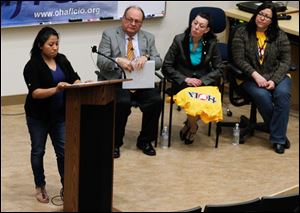
At immigration reform event, workers detail fear of exploitation on job
4/11/2013
Columbus resident Maria Sanchez talks of unfairness in the work-place during a statewide meeting at the University of Toledo.
A young woman stands on a stage in front of 200 people and shares how she and other co-workers at an Ohio restaurant work 60 hours per week, but often don’t get paid. If they complain, their boss threatens to call immigration officials and have the employees — all illegal immigrants in the United States — deported.
A mother of two young children weeps and shouts angrily because she and her two young children are alone after her husband was deported three years ago.
A dozen teenagers take turns waving a large banner that read “sin papeles, sin miedo con dignidad (Paperless, fearlessly with dignity).”
They were among the 200 people gathered Wednesday at the University of Toledo’s Driscoll Center to discuss immigration reform at a statewide meeting hosted by Toledo’s Farm Labor Organizing Committee.
“We are here and will remain in the shadows no longer,” Maria Sanchez, 21, of Columbus said. “We’re tired of living in fear. I am undocumented, but I can be productive and an asset to this country.”
Tim Burga, president of Ohio AFL-CIO, said his group is demanding that any immigration reform package include new laws that protect worker rights.
He also said the proposed reform must include a “broad road map to citizenship,” and that the “process should begin as soon as possible.”
His strongest comments were reserved for efforts by some senators and agricultural lobbyists to expand the guest worker program, which he said allows agricultural business owners to hire foreigners to work cheaper and under inhumane conditions.
On Wednesday, a committee of farmworker representatives and growers met in Washington to seek an agreement on the guest worker program, or H-2A.
Baldemar Velasquez, founder of Farm Labor Organizing Committee, attended the Washington conference to participate in negotiations with agricultural representatives.
Mr. Velasquez said the two sides agreed to place a cap on the number of guest workers who can enter the United States. The maximum number is 150,000, he said.
Mr. Velasquez said he is concerned because it appears no one wants to address the exploitation of foreign workers.
Even if a process is adopted that puts illegal immigrants on a path to citizenship, he said, it doesn’t matter if they are still underpaid, forced to work, and live under inhumane conditions.
“They can be legally exploited or illegally exploited, what’s the difference?” Mr. Velasquez said.
The growers and farmworker advocates have not agreed to new wage rates for farmworkers, which have declined 20 percent in the last two years, taking into account inflation, he said.
Juliana Kerr, director of studies special initiatives for the Chicago Council on Global Affairs, said a recent study conducted by her organization found the U.S. labor force needs more immigrants to remain globally competitive.
“Immigrants have long been a key factor to our story,” Ms. Kerr said.
Contact Federico Martinez at: fmartinez@theblade.com or 419-724-6154.